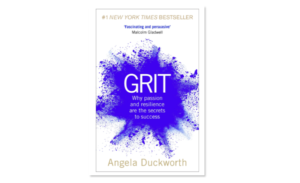“Above everything else I’ve done, I’ve always said I’ve had more guts than I’ve got talent.” ~Dolly Parton
“Grit” is probably the new trend when it comes down to personal success.
The word is coined by Angela Duckworth, psychologist, and popular science author who wrote the book “Grit: The Power of Passion and Perseverance” a New York Times bestseller.
What is it?
Have you ever wondered what separates some athletes from those who make it to the top level and those who don’t?
Why do some businesses fail and some succeed? Does the deciding factor come from your talent, IQ, or physical traits?
- In sports being physically gifted isn’t enough.
- Most of the richest people have around average IQ.
- If having talent is a large predictor of success then why work hard?
In psychology, grit is a positive trait based on an individual’s perseverance of effort and resilience combined with the passion for a particular long-term goal or end state.
It demands working tirelessly to overcome challenges while maintaining effort and interest over time despite their failures, bad luck, and difficulties.
Especially periods where you notice only small changes in progress, which is probably the most frustrating thing for us.
Gritty people are known to be stubborn once they have locked on to their goals they will not stop until they achieve them. Their ability to get back up quickly and run even after falling or being pushed down.
Importance
“Grit keeps you going for the day and not just the week, not just the months and years,” says Angela Duckworth. Often we focus too much on looking for shortcuts that can lead us down the path to our goals.
Our mindset towards talent is that without it the chances of being successful are slim and even not worth going through it.
We don’t think long-term and easily quit when our skills are not being raised fast enough.
However, when you develop grit and become more resilient to challenges. You will be able to stick to it long enough to see results and believe that failure is just part of the process making you tougher mentally.
An article from New York Post also wrote that “‘Grit’ more important to success than brains and brawn”. The ones who could get through an extremely brutal six-weeks military training program were usually not people with great cognitive and physical abilities.
The human body can withstand and accomplish a hell of a lot more than most of us think possible, and that it all begins and ends in the mind. ~David Goggins
Talent and Effort
I am sure you have noticed that in school, where some of your classmates who don’t pay attention in Maths class still manage to get good grades. Or someone who is skillful with their body can move and do things that are normally not very easy to do.
Talent does play a significant role and every one of us has a different baseline.
- Some people might be able to run faster and longer than others thanks to their genetics.
- Others may be more creative or sing better than others but of course, that does not mean success is guaranteed.
The effort is the key to a successful career. You may have heard the phrase “Hard work beats talent when talent fails to work hard.” Your potential can only be realized if you are consistent with your training to further develop it.
Talent X Effort = Skill
You know you are more talented than others if your skill improves at a rate faster than the others. In the data that Angela Duckworth found, the more talented people don’t tend to keep showing up.
“80% of success in life is just showing up” ~Woody Allen. He knew many talented people that could write a great book but they never finish or continue.
Talent is no guarantee that will help people show up and actually finish what they set out to do.
High achievers have this characteristic of the daily discipline of trying to get better. Putting in long hours and improving all the little details to reach excellence.
They submit themselves to the Japanese principle of continuous improvement ‘Kaizen’.
Moreover, in Duckworth’s research, she found that the ones who could improve quicker than the others were not always willing to put in the long hours and hours of work behind the scenes.
Put in the work
Only when you develop your ability will you be able to bring out the true potential within you and connect that to reality.
Even if you have one of the best natural talents, it’s nothing without grit.
When you have grit, you put in the practice required to develop your potential and that helps you become more skillful at what you do. This can help you come out on top of the people around you.
Your ability to self-control during tough times to keep going will be crucial to gaining the best achievement possible.
Our potential is one thing. What we do with it is quite another. ~Angela Duckworth
Is IQ related to it?
It’s not that you know how grittier someone is will you know how smart they are. IQ tests have been around for centuries and refined continuously over the years.
Measuring grit is not that easy and can even be fakable, unlike IQ tests.
During Duckworth’s career in teaching, she found out that some of her best students were not the ones with high IQs. The smartest students weren’t doing so well compared to her best students.
Your intelligence does play a role in achieving success in your work or at school. But having a high IQ is not the biggest predictor of achievement and successful life.
The difference in winning and losing is most often. Not quitting. ~Walt Disney
Economic success
Also when it comes to financial success, your family income, education, intelligence, or even physical looks does not stop you from being successful with money.
Thomas Stanley author of the Millionaire Mindset and The Millionaire Next Door: The Surprising Secrets of America’s Wealthy. During his research, he found that there is no correlation between IQ or grades in high school or college that determines who becomes a millionaire.
In fact, he states that most of them learned from their early failures or low grades, which motivated them to be successful. It was their passion for the things they do that they love and their focus to become extremely good at it.
Passion and Perseverance = Success
“Grit keeps you going for the day and not just the week, not just the months and years,” says Angela Duckworth. Oftentimes we focus too much on looking for shortcuts.
Passion is your intense desire to accomplish your goals. That can also mean being willing to suffer for what you love. Your passion isn’t about some strong emotions deciding your actions, it’s about having a strong belief in what you can achieve.
Perseverance is your unwavering determination to push through even during difficult times. You will experience feelings of hopelessness and when that happens, your ability to go through your fears will make you unstoppable.
Examples of famous people who became a success with perseverance and passion:
- Walt Disney was fired from his job because he “lacked imagination” and “no good ideas”
- Stan Lee was a comic book assistant until his book finally became a hit at age 39.
- Liam Neeson was a forklift operator and a truck driver who started acting at age 25 and received his first big break at 40.
- J.K. Rowling suffered poverty, and depression and was rejected by 12 publishers for her script Harry Potter.
- Muhammad Ali lacked all the physical traits to be a great boxer and was told he wasn’t a “natural boxer”.
Is it similar to hard work?
Yes and no, hard work is just one part of grit. After studying the science of achievement Duckworth found that just to become great at something deliberate practice is key.
Here is a short video where Anders Ericksson who studies world experts explains deliberate practice.
Deliberate practice is different in four different ways:
- Extremely intentional and problem-solving something such as making your first few seconds of the presentation sharper.
- 100% focus and practice with great effort.
- Getting feedback, ideally right away and information-rich.
- Reflecting on your whole performance and making refinements.
So if you want to get better it’s not just about getting out there and trying hard. It’s actually trying hard in those 4 very specific ways that can help you become an expert.
Why do we overvalue naturals?
I want to come back to discuss talent a bit more because even though we know that hard work is more important to success, we still tend to have this favoritism toward talent.
When people are presented with candidates who have equal achievements, they often judge the “naturally gifted” candidate as superior to the hard-working “striver.” ~Chia Jung Tsay
Chia Jung Tsay and Harvard social psychologist Mahzarin Banaji did a study on 103 professional musicians. They told the professional musicians 2 stories of pianists A and B. Pianist A was naturally talented and Pianist B was someone who had to work really hard.
Both Pianist A and B played the same music piece and had the professional musician listen to it and rate the scores between them. The results came out and the one who got the higher score was Pianist A the naturally talented one.

However, in reality, Pianist A and Pianist B were the same people. This showed that as a society we have this natural bias toward the people who are naturally talented. Why is that?
We excuse ourselves
“When you make someone extraordinary when you think of them as being naturally talented, you don’t have to compare yourself to them,” says Duckworth.

Not having to compete and measure yourself to someone better than you can make you feel better.
But if we do this often, we let ourselves off the hook by making someone extraordinary. You miss the opportunity to practice grit to actually get better and persist over the long run.
If instead, you look at those amazing people and what they accomplished and said over time with enough effort I can pile up my results, then I can do something extraordinary as well or at least something similar.
Correlation with Growth mindset
- Are you a gritty person or not?
- Are your traits fixed and can’t be developed?
- Can we develop grit?
We like to convince ourselves that some traits like grit, for example, can’t be developed. And honestly, I also thought every different people around me have different levels of grit which are fixed.
“I am either a gritty person now or I am not yet“. This mindset is important in all aspects of life if you want to become the best version of yourself.
The characteristics of gritty people are common to people with a growth mindset. A growth mindset is a broader idea surrounding their perspective on life. I have an article going into more detail here.
Strive for Excellence, not Perfection
When becoming a grittier person, you don’t look for perfection. Perfection can be harmful to our progress. We need to accept the fact that we and others are imperfect.
We never taste happiness in perfection, our most fortunate successes are mixed with sadness. – Pierre Corneille
A perfectionist is someone who is overly concerned with minor details, inflexible, and even unforgiving. Am not saying we shouldn’t ignore it and not have any standards towards a performance such as gymnastics.
But perfection is measured differently by other people’s perceptions of their ideal. Achieving it is not possible and you will only be chasing unrealistic opinions of others.
Developing an attitude of excellence is not the endpoint. It is an ongoing journey of self-improvement. You allow yourself for failures and embrace them when you are on the road to achievement.
Here’s how to develop it
Although we can’t do much about the genes or the environment we were born in. The good news is that there are a number of ways you can develop grit.
There is a four-part formula that Angela Duckworth has come up with for us to become more gritty people:
1) Practice
As mentioned before, putting in deliberate practice is crucial. When you set out what to do, try new methods and track your progress, you will have valuable feedback from your experiences.
Don’t waste time on a meaningless activity that is just “enjoyable”. Instead, look for ways to improve your strengths and find weaknesses to get rid of.
As Anders Ericksson a professor in the psychological nature of expertise and human performance says: “If you’re enjoying it, you’re doing it wrong. The people who engage in it don’t do it because it’s fun. They do it because it makes them experts in their fields.”
2) Purpose
The word purpose is being thrown around a lot nowadays with people not being satisfied or happy with where they are in life. Ultimately to find your purpose in life or a so-called “calling in life”, connect your work to how it can benefit the people around you.
Angela Duckworth found that “grittier people are dramatically more motivated than others to seek a meaningful, other-centered life.”
Be crystal clear on your “why.” Why do you do what you do?
3) Hope
Be bolder with your life, gritty people don’t sit around hoping for good things to come to them. Instead, they go out to look for them.
Grit depends on a different kind of hope. It rests on the expectation that our own efforts can improve our future. “I have a feeling tomorrow will be better” is different from “I resolve to make tomorrow better.” The hope that gritty people have has nothing to do with luck and everything to do with getting up again.
You need to accept the challenges that will come your way and know that when you overcome those challenges you are a step closer to becoming the person you always wanted to be.
4) Fight your feelings
Grit isn’t about having a dose of amazing inspiration or courage. Our feelings shouldn’t determine our actions and motivation comes and goes.
It’s the commitment to do the work on a consistent basis, building a routine and habits that can support your schedule to keep showing up.
Everyone will have days where they just don’t feel like doing it, but growth only occurs when you are doing things you are uncomfortable with.
Don’t react to the feelings of low motivation or your thoughts of being unable to achieve some of the things you don’t think it’s possible.
(LiveyoungLivewell)
If you quit, no one is going to stop you. It’s only you who will be lying on your death bed, wondering,
What if?
What if I had taken more effort to build up what I was great at, and interested in?
Instead, recognize those emotions and respond in a way to either look to solve them or disregard them as it’s not helping you become better.
Humans are creatures of habit. If you quit when things get tough, it gets that much easier to quit the next time. On the other hand. If you force yourself to push through it, the grit begins to grow in you.
~Travis Bradberry
Now what?
You know that having grit is a better measure of success. Talent and potential cannot be truly realized without hard work. Find out your interests by either taking a personality test or a career-related quiz online.
Once you find that out, put it into deliberate practice and be consistent with it.
Learn more about how having a growth and a fixed mindset can affect not only your achievements in your professional life but also your social life here.
Getting comfortable with being uncomfortable is a good place to start, to learn more about it click here.
Our emotions are fickle and unpredictable, you don’t need the motivation to start it comes after you set up a routine and build small habits to support your goals.
You have one life, make the most out of it. What is the one thing that you know you should be doing right now?



